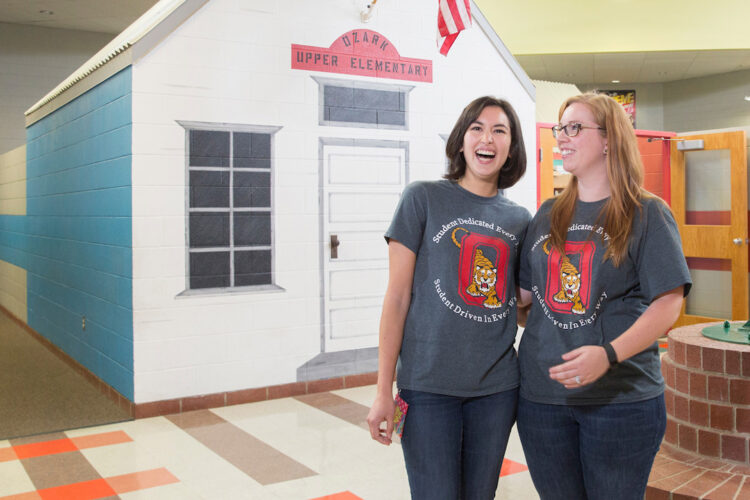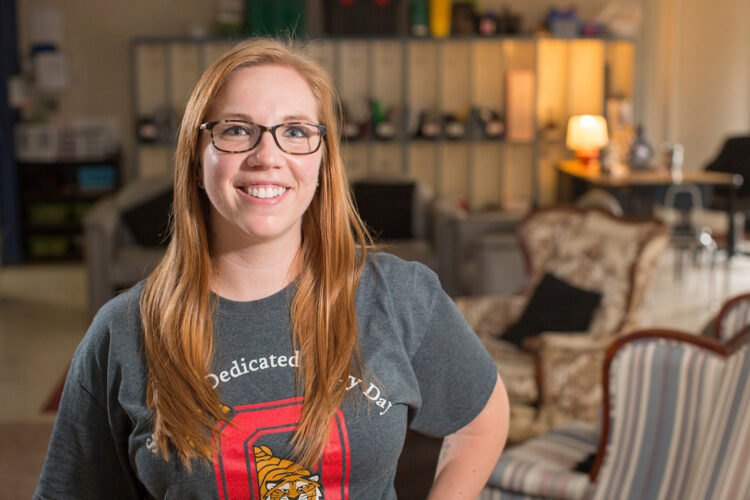Beckman and Ortman are special education teachers in the Ozark (Mo.) R-VI School District.
They earned their bachelor’s and master’s degrees at Missouri State University and were frequent classmates in the College of Education, quickly bonding over a common interest in special education studies.
“We were both like-minded, always wanting to know what the best practices are, what the new evidence-based things are,” Beckman said. “We were the people texting after reading an article, ‘Oh, did you see this thing in the article? How cool is that?’”

The use of technology in the classroom remains one of their favorite subjects. Special education students often struggle to develop independence and confidence, but technology is a familiar and often comforting tool that can help with such an issue.
“When (our students) start to get to around 6th grade, they really start to realize that they think a little bit differently than typical kids and so, using the technology helps build their confidence with their peers,” Ortman said.
Beckman and Ortman, who both teach at Ozark Middle School, have implemented tech-friendly teaching strategies for their special education students.
Putting research into practice
For her thesis project, Beckman used a web-based, self-monitoring application called iConnect. Originally designed for at-risk high school students, Beckman wanted to see if the app could also help younger, special education students who were struggling to remain on task.
“I went to a conference and actually learned about (iConnect) and a similar study that had been done, and thought it was really cool. We were able to reach out and collaborate between MSU and (Kansas University) and it just seemed like a great system to use,” Beckman said.
The iConnect, a customizable app, can track students’ classwork and keeps them focused with a regular pop-up question that asks: “Am I on task?”
One student in particular shows the great potential of iConnect.
Charlie was struggling not only with his math work, but even staying on task was in itself a task. After using iConnect for one year, he showed huge improvements.
“Before iConnect, he was off-task 80 to 100 percent of the time,” Beckman said. “He would be refusing to do his work, hitting his head on the table, laying on the ground and he wasn’t doing any of his work.”
Beckman was pleasantly surprised to see that after using iConnect, Charlie made a complete shift from being 80 percent off-task to 80 percent on-task. His math coursework improved significantly too.
“I think he really enjoyed how he felt like he was doing it and he felt independent in his work instead of feeling like he needed to rely on teachers,” Beckman said. “It was up to him. He enjoyed using (iConnect) and wanted to continue using it.”
After completing the iConnect study with Charlie and another student with autism, Beckman shared her findings at the Missouri State University College of Education symposium.
Technology lets personality shine

Technology also has a major role in Ortman’s special education classroom.
Her students, for example, can show reading comprehension through the use of Chromebooks. Whether it’s independent reading or teacher-read, students enter their responses into Google Docs.
“We sort of have a running record of all their responses,” Ortman said. “I print all those and then I go back with the kids and I look at how they improved over the year with their comprehension.”
This approach is a stress-free solution to the traditional pen-and-paper style that often hinders special education students.
The tech-savvy teaching methods by Beckman and Ortman have parents excited.
“The parents love it,” said Ortman, who also presented her master’s thesis to the Missouri State University College of Education symposium.
“They love that their kids can get their ideas across without being freaked out by the idea of having to use a pencil and paper to write things down and we’ve seen so much more into the kids’ minds and into their personalities with the help of using (tech).”
Support along the way
With Dr. Linda Garrison-Kane, professor in the Department of Counseling, Leadership and Special Education (CLSE), as an advisor, Ortman and Beckman got the insight and guidance needed to complete their master’s degrees: special education with an emphasis in autism spectrum disorder.
“(Dr. Garrison-Kane) really just took me under her wing, as far as what to do in conferences and with data and everything,” Ortman said. “I loved being a part of studies and going to classes and learning things and having the professors really care about you.”
As undergraduate and graduate students, Ortman and Beckman worked on research and made presentations at conferences.
“Because of that, I think they had the opportunity to see the power of research and the need for research,” Garrison-Kane said. “They immersed themselves in research-based practices and then went on to pursue their master’s with me.
“They’re excellent students, advocates for children and I’m incredibly proud of them. I’ve had really great students within our program and I’ve been fortunate to work with some incredible individuals. Those two are most definitely two of my best.”
MSU’s curriculum laid the foundation for Beckman and Ortman’s approach to teaching.
“I felt like I was really prepared for my (current) job,” Beckman said. “With my master’s, I really liked that I got specific information, specific course work working with students with autism and it helps me know that what I’m doing is evidence-based and research-based and best practices in the field.”

